Disposal of property, lack of support, and inadequate housing amongst grievances for the homeless in Victoria
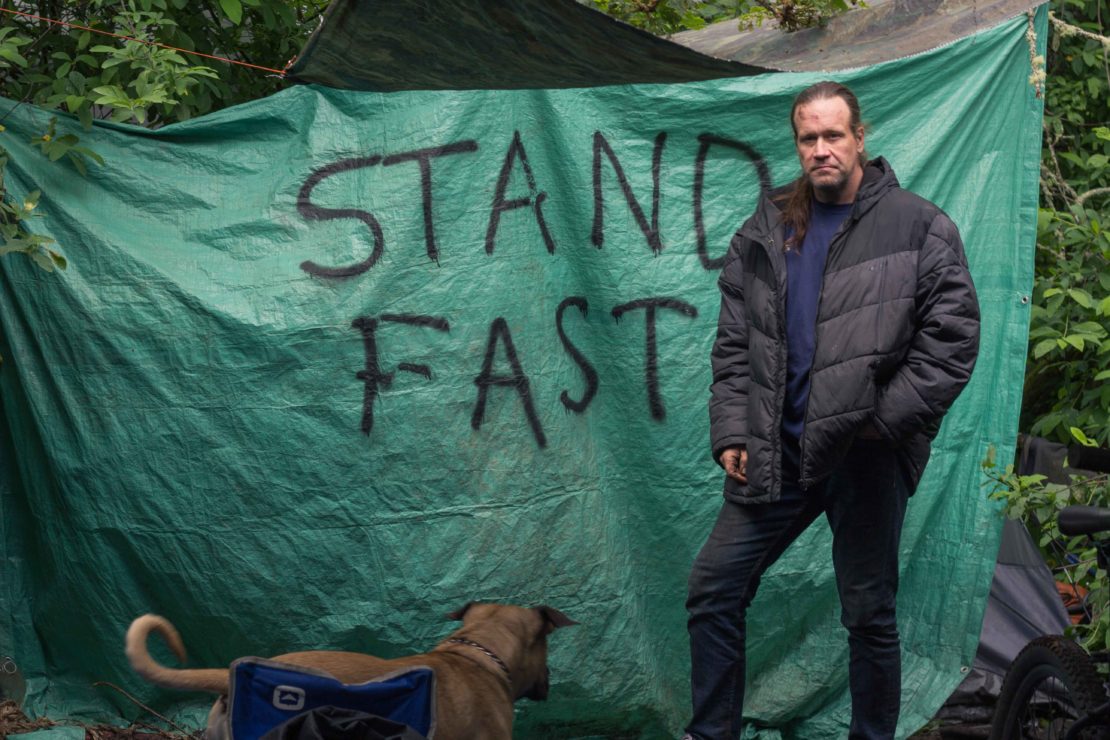
The tent camps at Topaz Park and Pandora Avenue were dismantled between May 20 and 24, in an effort by the B.C. government and the City of Victoria to reduce the spread of COVID-19.
Despite these intentions, encampment residents have voiced complaints about the process. Although they were promised housing, many residents are still without homes and without the community and services, they had in the camps. Residents also report that their tents and belongings have been destroyed or disposed of by the demolition company contracted by BC Housing to take apart the camps.
The B.C. government and Victoria City Council have responded by promising to work to ensure that all those without housing will be able to receive it if they wish. So far, the province has bought two hotels to house the residents and plans to convert them into permanent housing. The Save on Foods Memorial Centre is also being used temporarily.
Dismantling Topaz and Pandora
On April 24, the B.C. government ordered the evacuation of the camps in Topaz Park and along Pandora Avenue. Minister of Public Safety and Solicitor General Mike Farnworth justified the decision by saying that the camps “pose a risk to the health, safety and welfare of the persons in the Encampments.”
To provide temporary housing for those displaced by the order, the province purchased a Comfort Inn and Suites property and signed an agreement with the proprietors of the Save on Foods Memorial Centre to house people in the arena.
Including the inn, arena, and other spaces throughout Victoria, the province stated that 440 beds were available.
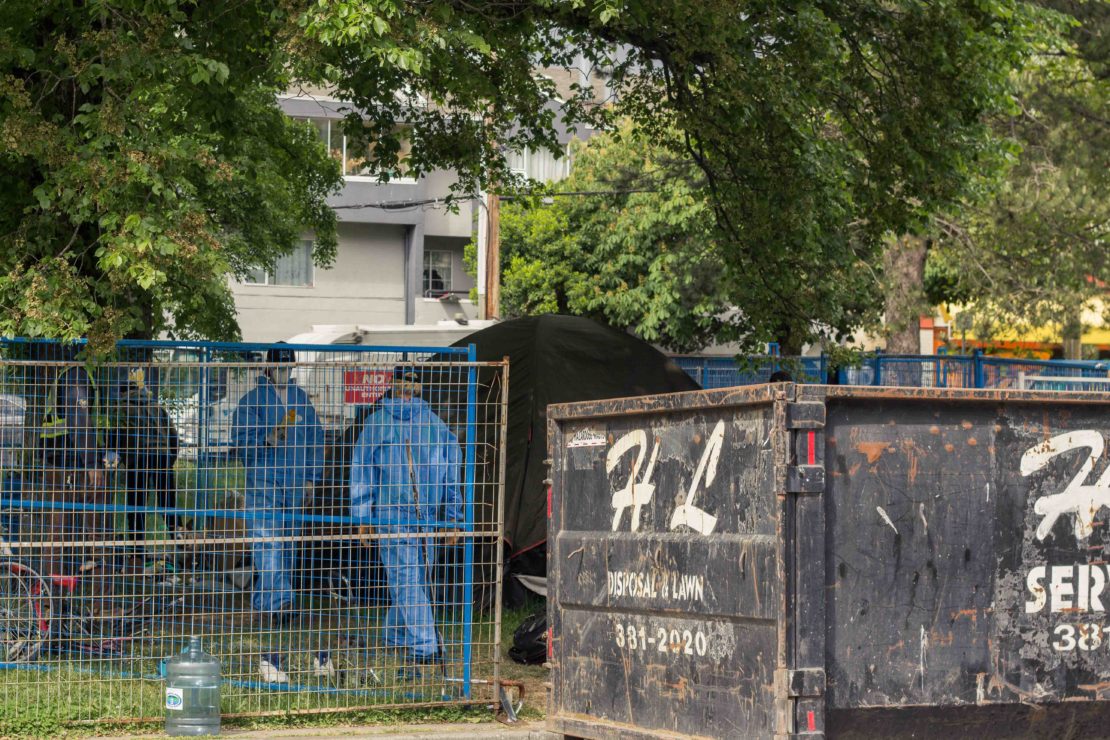
Starting May 20, BC Housing, H.L. Demolition and Waste Management, bylaw officers, and the Victoria Police Department (VicPD) began to evacuate the Topaz and Pandora camps. Another ministerial order gave the VicPD “operational discretion” in the evacuation and permitted police officers to remove anyone not complying with the ministerial orders.
In a letter to Attorney General David Eby, human rights non-profit Pivot Legal Society expressed their concern with “the government’s rapid and enforcement-based decampment process.” The letter voiced concerns of insufficient communication by the government with residents and a lack of care towards people’s personal possessions.
The Martlet was told by people in the street community that the government did not have enough housing, that residents’ belongings were being disposed of by H.L., and that people were being told to leave the camps with little recourse to access the services and community they had come to rely on.
H.L. Demolition and Waste Management were also documented by legal observers offering residents $20 in exchange for their tents, which would then be destroyed. At least one employee of H.L. was seen getting into an altercation with a resident, for which a police report was filed. Eight residents were also arrested by VicPD during enforcement of the order.
Sarah and Terry, residents of the tent community at Pandora, spoke to the Martlet about their experiences with the decampment process.
“They put these papers up, and they think they can threaten us with evictions, and then they put them in hotel rooms, so that they deal with the [homeless] problem,” said Terry. Terry relies on a mobility scooter and said that he would not take a hotel room due to accessibility concerns.
“They don’t offer people a choice. I was confronted by [a police officer] earlier today and he told me ‘well, you have to take the hotel room,’” said Sarah. “I’ve been told numerous times they are all out of hotels.”
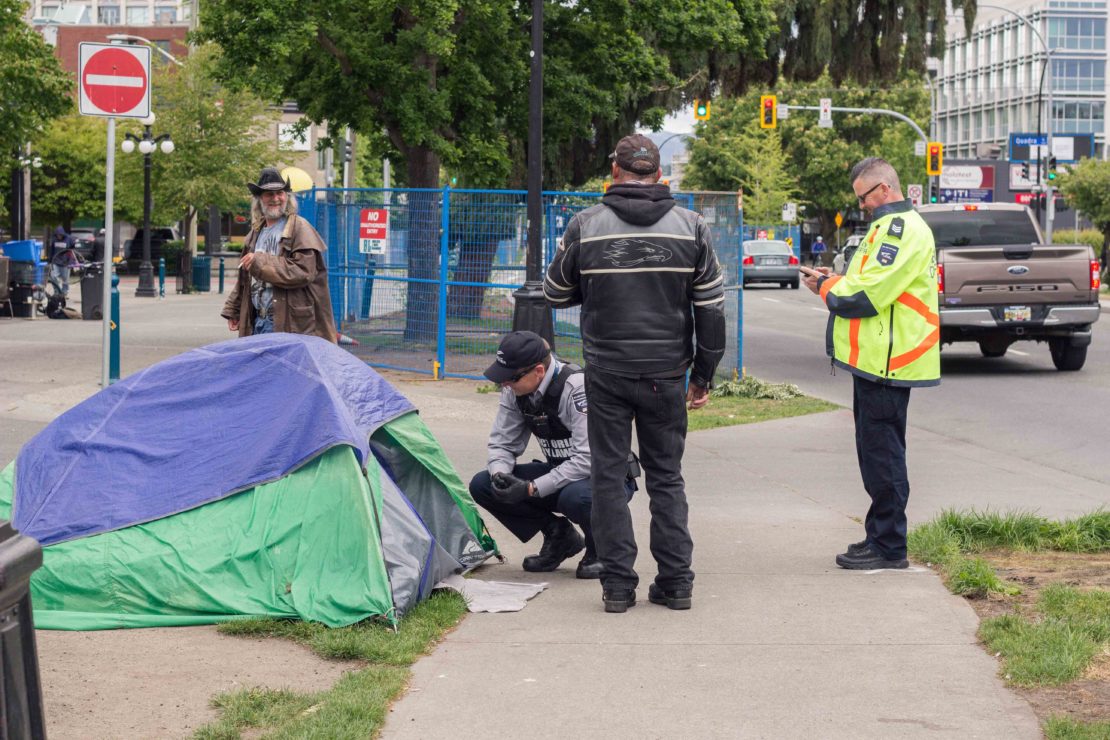
Legal observers that witnessed the eviction confirmed these experiences.
“Legal observers noted widespread confusion regarding the eviction process, the storage, disposal and return of belongings, the process of finding alternative housing, the terms and conditions surrounding alternative housing, and the extent of police powers and the powers of public health officials relative to the civil rights of residents,” said Legal Observers Victoria in a statement.
Both Topaz and Pandora were officially cleared by May 25, and although BC Housing has said that more than 340 people have been housed, the process is still far from complete. Legal Observers estimate 90 people around the city are still without housing. Victoria City Councillor Sarah Potts thinks that this number could be higher.
“There’s 90 people counted there, 400 or so with the B.C. registry, but the point-in-time count was much higher, upwards of 1 000 people.” Potts said in an interview with the Martlet. “The work is far from over.”
Numbers rise at Beacon Hill Park
The dismantling of two major homeless camps has put pressure on another camping site, Beacon Hill Park.
Shea Smith has been homeless for the past two years and has been camping in Beacon Hill for the last seven months. The unemployed journeyman welder helps maintain a donation tent in collaboration with several advocacy groups including The Backpack Project and Pivot Legal Society. Smith has recently taken to Twitter and runs a podcast with two other homeless individuals to raise awareness of their situations and to make their voices heard.
As other camps are being dismantled by orders, Smith expects numbers in Beacon Hill to grow. Newcomers are introduced into a community, says Smith, emphasizing the differences between the homeless communities of Beacon Hill and Topaz — where the structure of the camp was maintained by the city.
Smith says that he understands concerns people have about safety and damage to the park, and says that the street community is trying everything they can do to stay respectful and keep crime away, but that it will be harder to maintain as numbers grow.
“We’re not in any position to kick anybody out, right? So your own actions kind of [have to] speak for yourself,” said Smith.“We have nowhere else to go, and this is where we’re allowed to be right now.”
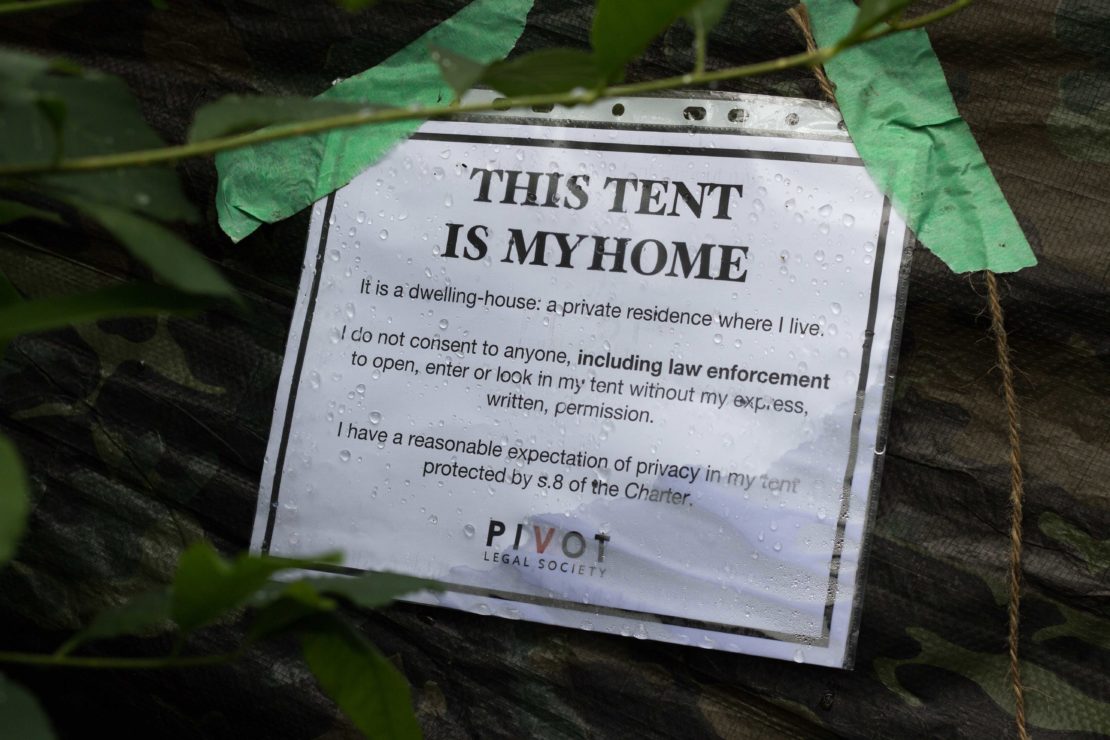
A crisis beyond camps
Despite the recent focus on Topaz, Pandora, and Beacon Hill, there are many others who live on the street or in tents and receive even less support. They are scattered across Victoria and often find it hard to get in contact with support or advocacy groups, especially with COVID-19 closures.
Colin Clark is one of the unhoused people in Victoria who is living outside of the communities of Topaz, Pandora, or Beacon Hill. He spoke to the Martlet about the struggles of living on the street, facing discrimination from the community, and most of all his desire for stable housing.
Clark says that he bounced around foster care during childhood. Once he turned 18, he was left without any transition other than having his name put on the BC Housing Registry and has spent most of his time since living in a tent on the street, in shelters, or with friends.
“[I feel] like a second-class citizen,” said Clark. “Besides numerous times having my stuff thrown out by the [Capital Regional District] or other people stealing our stuff … it’s been a constant struggle really.”
Clark also says that there has been a lack of communication as well as a lack of cooperation between advocacy groups, the government, and members of Victoria’s unhoused community.
“I was talking with one of the people that work with the [Homeless Coalition] at the Travelodge building, all the people that were at Topaz that didn’t get a place in the hotel were supposed to go to the Travelodge right away and they would get a place but nobody said that to anybody,” said Clark. “A lot of people just got screwed because they didn’t know they were supposed to do that.”
Most of all though, Clark says he just wants stability and a roof over his head.
“Trying to figure out housing,” said Clark when asked if there is anything he is focusing on right now. “I’m getting quite sick of being on the street.”
Government response
In response to the concerns of members of Victoria’s unhoused community, support workers, and advocacy groups, the provincial government has defended their handling of the decampments.
“We worked closely with our partners, the City of Victoria, BC Housing, Island Health and non-profit service providers to take a compassionate and respectful approach to providing appropriate accommodations and wraparound services like meals, health, mental health and addictions,” a spokesperson for the Ministry of Social Development and Poverty Reduction said in an email interview with the Martlet.
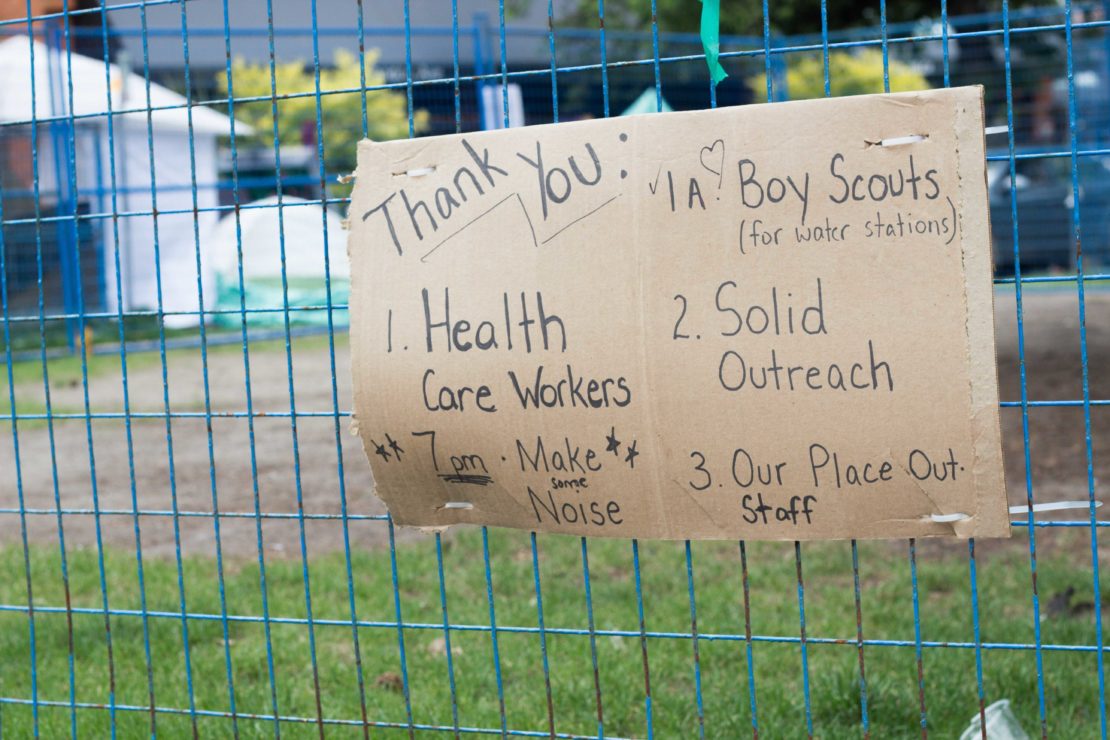
The spokesperson also explained that camp residents were not permitted to keep their tents out of concern that they posed a “health risk.”
In an effort to provide additional housing, the province has also bought Paul’s Motor Inn.
Victoria City Council has, however, called on the province to do more.
During the May 28 Council meeting, council passed a motion to pen a letter to Premier John Horgan and urge him to “mobilize sufficient resources to offer housing with appropriate social care and health care to all unhoused people in the Capital Region.”
Finding solutions within the street community
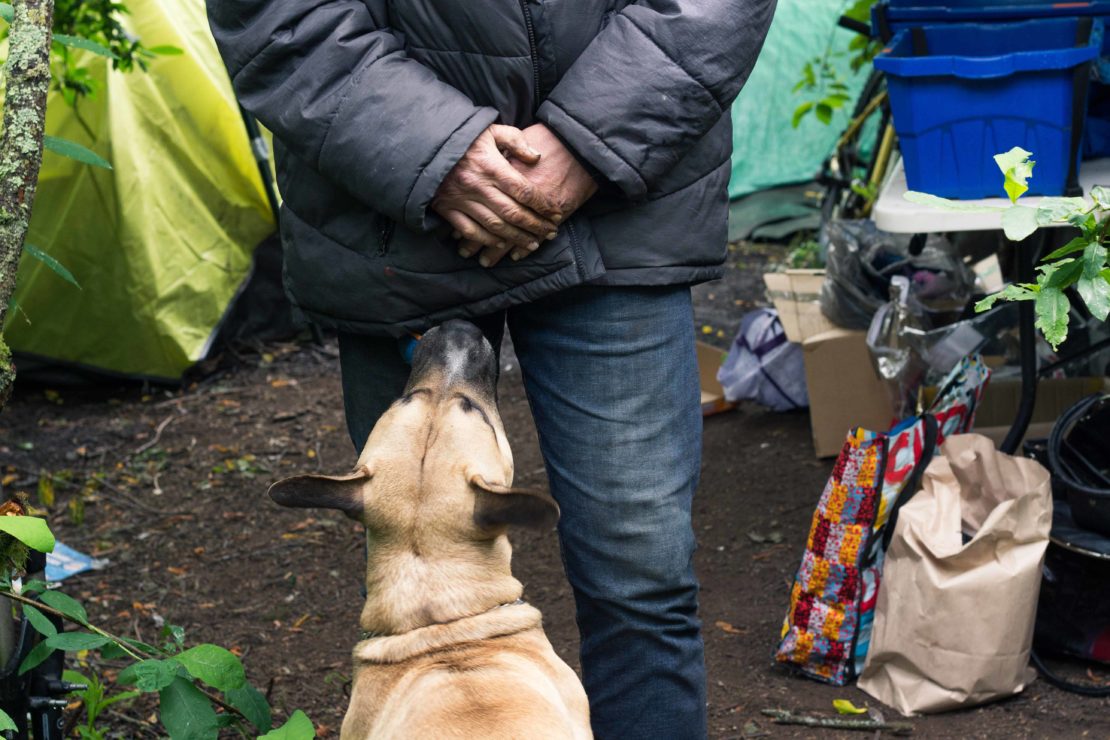
Members of the street community and others have raised concerns about the extent to which the government involved unhoused residents in decisions about their lives.
“I think there’s always room for us to ensure that the voices of marginalized people and unhoused people are included in decision making,” Potts said. “I would hope that going forward we ensure that there is the right kind of dialogue and engagement because people who are unhoused have the right to self-determination as well.”
Similarly, Smith hopes that the street community will have a voice at the meetings that decide their future and called the city’s homelessness crisis a “multi-headed dragon.”
“It’s an absolutely amazing thing that they’ve done,” said Smith regarding the current hotel initiative, but he’s hoping for something more than that: “I want to see something that works.”







